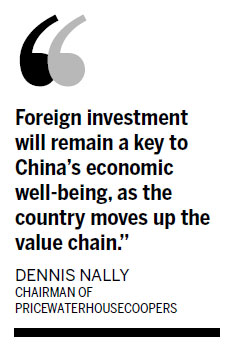Economy's growth seen as stable, not surging
Updated: 2013-03-24 08:08
By Wei Tian (China Daily)
|
|||||||||||
Experts debate what China must do to step up to the next level
The current economic resurgence is only "temporary" as China's growth has shifted into a medium-speed gear, a senior researcher said on Saturday.
"Some may think the economic growth has bounced back from the bottom since the fourth quarter last year and will regain high-speed growth above 9 percent - but they are too optimistic," said Liu Shijin, deputy director of the Development Research Center of the State Council, speaking at the 2013 China Development Reform in Beijing.
|
 |
China's quarterly GDP growth was down to a three-and-half-year low of 7.4 percent year-on-year in the third quarter in 2012, but rose to 7.9 percent in the fourth quarter.
Liu said the potential growth rate of the world's second-largest economy will be sustained at 7 to 8 percent in next two years, from a double-digit growth over the last decade, and will eventually stabilize at 6 to 7 percent.
But this is not necessarily bad news: Economies that have successfully transformed to a high-income economy, such as Japan's and South Korea's, have experienced a similar transition. When their national income reached a certain level, their growth rates were lowered by 30 to 40 percent.
Zheng Yongnian, director of the East Asian Institute at National University of Singapore, who was also speaking at the forum, said if China could maintain a 6 to 7 percent growth rate for 10 to 15 years, the country could transform to a high-income economy just like Japan and South Korea did.
However, if the country fails to do so, and lacks necessary reform, it will be stuck in a middle-income trap similar to the situation in Thailand and the Philippines, he said.
"China's policy stance now should focus on preventing the economic growth rate from sliding too fast, rather than raising it to a higher level," Liu said. But China still has adequate measures to boost growth, he said, such as urbanization, technological upgrades, and boosting domestic consumption.
Liu said China's urbanization level could grow another 20 percentage points, up from the current level of 52 percent, and this will generate 30 percent more consumption by more than 200 million residents. Meanwhile, if the country's industrial added value reaches a level equal to that of the United States, it will increase by 70 percent.
Another important contributor will be the optimism of foreign firms.
"In our recent survey, more than 70 percent of the participants with operations in China plan to increase their investment here over the coming five years," said Dennis Nally, chairman of global consulting firm PricewaterhouseCoopers. More than 80 percent anticipate their revenues in China will increase in 2013, PwC's survey showed.
"Foreign investment will remain a key to China's economic well-being, as the country moves up the value chain, shifting from 'made in China' to 'designed in China' and finally to 'innovated in China'," Nally said.
Stephen Roach, senior fellow at Yale University's Jackson Institute of Global Affairs, noted that the per-capita capital stock was only 13 percent of that of the US and Japan. Therefore, much more investment is needed in the next few years to improve the country's productivity.
Nobel laureate Joseph Stigliz said a larger share of the future GDP will go to the workers, and more public spending is needed for healthcare, education and building livable cities.
weitian@chinadaily.com.cn
Related Stories
China's economy may see strong rebound 2013-03-19 05:36
Remaking economy tops new leadership's agenda 2013-03-15 19:44
China's economy shows signs of recovery 2013-03-08 15:31
China's economic planner 'confident' in economy 2013-03-06 12:50
Chinese economy not a 'gray swan' 2013-03-02 21:06
Today's Top News
Police continue manhunt for 2nd bombing suspect
H7N9 flu transmission studied
8% growth predicted for Q2
Nuke reactor gets foreign contract
First couple on Time's list of most influential
'Green' awareness levels drop in Beijing
Palace Museum spruces up
Trading channels 'need to broaden'
Hot Topics
Lunar probe , China growth forecasts, Emission rules get tougher, China seen through 'colored lens', International board,
Editor's Picks

|

|

|

|

|

|





